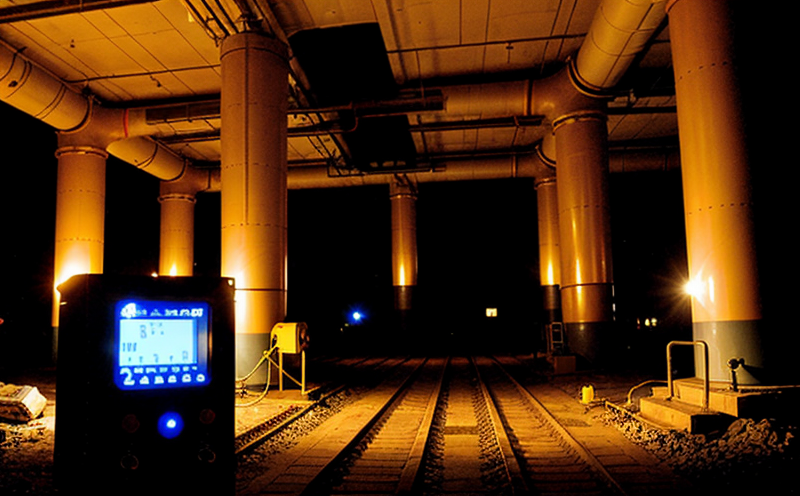ASTM E1164 Calibration of Radiation Detection Instruments Testing
The ASTM E1164 standard is a cornerstone in the calibration and quality assurance of radiation detection instruments used across various sectors, including mining. This service ensures that detectors are accurate and reliable, which is crucial for compliance with regulatory standards and ensuring worker safety.
Calibration under ASTM E1164 involves exposing calibrated detectors to known gamma ray sources at defined levels and positions. The detectors' responses are then compared against expected values derived from the standard's appendix tables. Any discrepancies are addressed by adjusting the detector settings until it meets the specified accuracy requirements.
In a mining environment, the presence of naturally occurring radioactive materials (NORM) can pose significant challenges to accurate radiation detection. This service ensures that detectors used in such environments are calibrated correctly, mitigating potential risks associated with incorrect readings. For instance, a miscalibrated detector might fail to detect hazardous levels of radon gas or gamma rays, leading to unsafe working conditions.
The ASTM E1164 standard is widely recognized and accepted across the mining sector for its rigorous approach to calibration. It ensures that all instruments used in radiation monitoring are consistent with industry best practices. This consistency is essential for maintaining quality control and compliance with regulatory requirements.
Our service provider adheres strictly to the ASTM E1164 standard, ensuring that the calibration process meets the highest industry standards. We use state-of-the-art instrumentation and follow precise protocols to ensure accurate results. The service includes a detailed report that outlines the calibration process, any adjustments made, and the final performance of the instrument.
For mining applications, this service is particularly important because it helps in maintaining the integrity of radiation monitoring systems used in underground mines or surface facilities where radioactive materials are present. Proper calibration ensures that these systems can accurately detect and measure radiation levels, thereby safeguarding worker health and safety.
The ASTM E1164 standard also provides guidelines for the use of different types of detectors, such as scintillation detectors or semiconductor detectors, which may be used in mining environments. These detectors are chosen based on their suitability for specific applications within mines, ensuring that they can accurately measure radiation levels under various conditions.
Understanding the scope and requirements of ASTM E1164 is crucial for compliance with regulatory standards such as the Mine Safety and Health Administration (MSHA) in the United States. These regulations mandate regular calibration of radiation detection instruments to ensure their accuracy and reliability. By adhering to the ASTM E1164 standard, our service ensures that mining facilities meet these legal requirements, thereby reducing the risk of non-compliance penalties.
Our team of experts is well-versed in the intricacies of ASTM E1164 and can guide you through the entire calibration process. From initial setup to final reporting, we ensure that every step adheres to the standard's stringent guidelines. This service not only enhances compliance but also improves operational efficiency by ensuring accurate and reliable radiation monitoring.
Applied Standards
| Standard | Description |
|---|---|
| ASTM E1164-19 | This standard provides guidelines for the calibration of radiation detection instruments using gamma rays. It includes procedures, acceptance criteria, and performance specifications. |
| ISO 8529-3 | An international standard that specifies requirements for the production, testing, and quality assurance of scintillation detectors used in radiation monitoring systems. |
Why Choose This Test
The ASTM E1164 calibration test is essential for several reasons. Firstly, it ensures that all radiation detection instruments are accurate and reliable, which is critical for maintaining compliance with regulatory standards. Secondly, the service enhances worker safety by ensuring that detectors can accurately measure radiation levels in mining environments.
Compliance with ASTM E1164 is mandatory for many industries, including mining, where naturally occurring radioactive materials (NORM) are present. Regular calibration under this standard ensures that detectors are up to date and functioning correctly. This is particularly important in underground mines or surface facilities where radiation exposure can be high.
The service also helps improve operational efficiency by ensuring accurate and reliable radiation monitoring. By adhering to the ASTM E1164 standard, mining facilities can reduce the risk of non-compliance penalties imposed by regulatory bodies such as MSHA in the United States. This not only ensures legal compliance but also enhances worker safety.
Our team of experts is committed to providing a comprehensive service that meets all your calibration needs. From initial setup to final reporting, we ensure that every step adheres to the ASTM E1164 standard's stringent guidelines. This service not only enhances compliance but also improves operational efficiency by ensuring accurate and reliable radiation monitoring.
In conclusion, choosing this test ensures that your radiation detection instruments are calibrated according to the highest industry standards. It is a crucial step in maintaining worker safety and compliance with regulatory requirements.
Quality and Reliability Assurance
- The service provider adheres strictly to ASTM E1164 standard protocols.
- We use state-of-the-art instrumentation for accurate calibration.
- Detailed reports are provided that outline the calibration process, adjustments made, and final performance of the instrument.
- Our team of experts is well-versed in the intricacies of ASTM E1164 and can guide you through the entire process.
These quality assurance measures ensure that your radiation detection instruments are calibrated accurately and reliably. This not only enhances compliance but also improves operational efficiency by ensuring accurate and reliable radiation monitoring.





